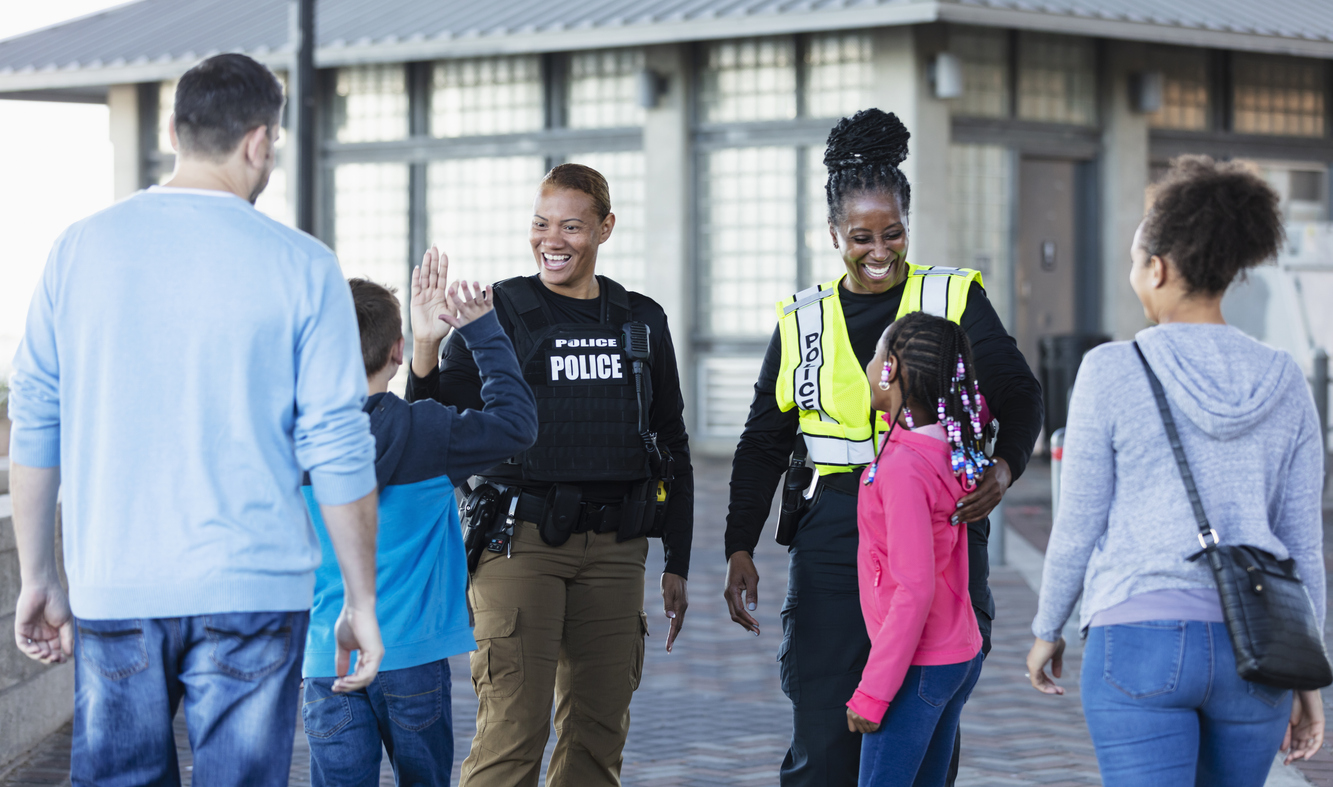What Is Community Policing?
Written by:
Wilson College
• Dec 21, 2023

Law enforcement agencies can strengthen their effectiveness in a variety of ways, and community policing is an approach that many have instituted. In 2023, the U.S. Department of Justice reported that since 1994, it had provided grants to more than 13,000 law enforcement agencies to fund about 136,000 law enforcement officer positions to further the cause of community policing.
But what is community policing, and how can it enhance public safety? It’s helpful for anyone who may be interested in pursuing a criminal justice degree to explore the answers to those questions and learn about the important role community policing plays in the criminal justice system.
Defining the Concept: What Is Community Policing?
Community policing is a proactive, collaborative approach to help prevent crime. It focuses on increasing community involvement, forming bonds between a community and law enforcement, and establishing an effective law enforcement presence in a community.
In defining what community policing is, it’s important to understand the three major elements of community policing.
-
Partnerships between law enforcement and the community. Creating partnerships between law enforcement and community stakeholders is key to community policing. When implementing community policing strategies, law enforcement agencies partner with schools, human services agencies, community residents, volunteer groups, and similar constituents to work together to address community issues.
-
Proactively solving problems in a community. Through this component of community policing, law enforcement strives to identify and resolve the conditions that result in crime, rather than taking a reactive approach and responding to crime after it has occurred.
-
Organizational change. Successful community policing also rests on law enforcement agencies being willing to modify their structures and management approaches. For example, this could mean a law enforcement agency provides greater transparency about its activities, adjusts the way it trains law enforcement officers, or changes how it deploys law enforcement officers across a city.
Law enforcement agencies at multiple levels—including local, state, and Native American tribal—have implemented an extensive range of community policing strategies. These range from broad based (such as increasing law enforcement foot patrols to improve their visibility in a community) or more narrow in scope (such as placing resource officers in schools).
Benefits of Community Policing
People who are pursuing criminal justice careers can benefit from learning about the potential advantages community policing offers. The examples below highlight some of those benefits.
Strengthening Trust Between Law Enforcement and Community Members
Trust in law enforcement is critical, and increasing their interactions with, for example, community groups and marginalized individuals can help law enforcement agencies build strong relationships of trust. Establishing trust can encourage more citizens to report crime and initiate a greater level of communication between law enforcement and members of a community. Community policing programs have the potential to improve the public’s perceptions of law enforcement and reduce mistrust.
Improving Public Safety
Community policing can improve public safety in a range of ways. For example, it can provide community members with information on steps they can take to help prevent crime. Community policing can also provide law enforcement with specific information that can directly relate to strengthening public safety. For example, community policing efforts can identify specific types of training that law enforcement officers need. Programs in community policing that focus on youth can help deter young citizens from committing crimes by educating them about the consequences of engaging in criminal activity.
Expanding the Cultural Competency of Law Enforcement
Through community policing programs, law enforcement officers have the opportunity to learn about the culture of the communities in which they work. For example, they can form an understanding of how community members communicate with one another and how they support each other. They also can learn from history, and how previous interactions between citizens and law enforcement officers have affected the relationships between law enforcement and a community. Improving cultural competency can enhance interaction between officers and the members of a community and inform the training of new officers.
Opening the Door to Innovation
Community policing is not limited to a specified set of programs. Innovation is crucial in community policing. Implementing creative community policing strategies enables law enforcement to take fresh approaches to address long-term problems. For example, rather than taking traditional approaches to policing, law enforcement can implement strategies that are tailored to specific situations, such as preventing crimes related to homelessness or addiction.
Examples of Community Policing in Action
Reviewing specific examples that demonstrate what community policing is can help in developing an understanding of its effectiveness. The following describes some community policing programs that have been adopted, and helps show the extensive range of community policing ideas and strategies.
-
Addressing citizens’ mental health challenges. The state of New Jersey has created a program to send mental health professionals on police calls when citizens are experiencing mental health distress. The Alternative Responses to Reduce Instances of Violence and Escalation (ARRIVE) Together program has resulted in reductions in both the use of force in these cases and in arrests. The program also has resulted in an increase in the use of social services to address citizens’ mental health needs.
-
Engaging community youth. Through its Youth Police Advisory Council, the Houston Police Department gives high school students from across the city the opportunity to communicate with police and city leaders and express their concerns. This council has improved young people’s perception of law enforcement and enhanced law enforcement’s understanding of the concerns of young people.
-
Reducing recidivism. In Washington D.C., the Court Services Offender Supervision Agency and the Metropolitan Police Department have partnered to conduct joint visits at the homes of individuals who are on parole or probation. This collaboration gives law enforcement officers the opportunity to speak directly with these individuals and learn about their needs and concerns. Ultimately, the goal of the program is to keep offenders from committing more crimes and show them another path they can take.
Community Policing Can Strengthen Communities
Knowing what community policing entails is important for anyone who is interested in shaping the future of public safety. Having the ability to craft innovative approaches to preventing crime enables professionals in the criminal justice system to make significant contributions to communities and society at large.
Those who are interested in pursuing a role in criminal justice would do well to explore the Wilson College Online Bachelor of Arts in Criminal Justice degree program to learn how it can help them achieve their career goals. The program is designed to set the stage for rewarding work, offering students the opportunity to build real-world skills and expertise that are applicable to a variety of careers.
Embark on your journey to a career in criminal justice administration today.
Sources:
Brookings, “New Jersey Arrive Together Program Could Reform Policing as We Know It”
Community Policing Dispatch, “Probation and Line Officers – Partnerships to Protect the Public”
Houston Police Department, Volunteer Initiatives Program Youth Police Advisory Council (YPAC)
New Jersey Department of Law and Public Safety, ARRIVE Together Program
U.S. Department of Justice, Community-Oriented Policing and Problem-Oriented Policing
U.S. Department of Justice, Lessons to Advance Community Policing


